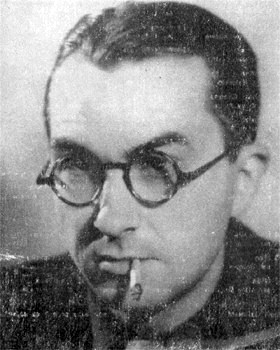Paul Nizan facts for kids
Paul-Yves Nizan (French: [nizɑ̃]; born February 7, 1905 – died May 23, 1940) was a French thinker and writer. He was born in Tours, France. He studied in Paris and became good friends with Jean-Paul Sartre at school.
Paul Nizan joined the French Communist Party. Many of his writings showed his political beliefs. However, he left the party in 1939 after the Molotov–Ribbentrop Pact was signed. He died fighting in World War II during the Battle of Dunkirk.
His books include Antoine Bloye (1933), Le Cheval de Troie (which means 'The Trojan Horse'), and La Conspiration (which means 'The Conspiracy') (1938). He also wrote essays like "Les Chiens de garde" ("The Watchdogs") (1932) and "Aden Arabie" (1931). "Aden Arabie" became very popular when it was re-released in 1960. Its famous first line, "I was twenty, I won't let anyone say those are the best years of your life," became a key phrase for student protests in May '68.
Paul Nizan's Life Story
Paul Nizan grew up in a middle-class family. His father worked for the railway before World War I. His father's career later inspired Nizan's novel Antoine Bloye. This helped Nizan understand how people can feel disconnected or alone in society.
In 1926, Nizan paused his studies at the École Normale Supérieure in Paris. He went to Aden (a city in Yemen) to teach the son of a rich French businessman. He used his six months in Aden to write his first short novel, Aden Arabie, published in 1931.
After returning, Nizan took on various jobs for the French Communist Party (PCF). He wrote a lot for their newspaper. At one point, he even managed a party bookshop in Paris. Later, Nizan became a literature professor. Students liked him because he was friendly and relaxed. He sometimes even offered them cigarettes in class. As a teacher, he didn't force his own views on Marxist theory. Instead, he encouraged students to form their own ideas. During this time, before World War II, Nizan wrote all his main works. These included "The Watchdogs," which explored ideas about the real world, and his novels Antoine Bloye and The Conspiracy.
In August 1939, Nizan left the French Communist Party. This happened after the Molotov–Ribbentrop Pact was signed. This agreement was between Germany and the Soviet Union. Nizan did not leave because he thought the Soviet Union's actions were "bad." He felt the French Communist Party was not clever enough politically.
Only events will confirm or invalidate me. But not arguments of the moral type. It was not because I thought the USSR's agreement with Berlin was "bad" that I took the resolution I took. It is precisely because I thought that the French Communists lacked the necessary political cynicism and the political power to lie that would have been necessary to derive the greatest benefits from a dangerous diplomatic operation. Why didn't they have the audacity of the Russians?
Nizan had strongly supported the anti-fascist movement. This movement was against a harsh, controlling type of government. He also supported the republican side in the Spanish Civil War. Because of this, he could not accept the party's quick change away from the "popular front" (a group of different parties working together). Soon after, Nizan joined the French army when World War II began. He was killed in action on May 23, 1940. This happened at the Château de Cocove in Recques-sur-Hem, during the German attack on Dunkirk.
Paul Nizan's Political Views
Paul Nizan's political ideas changed a few times during his life. His friend Sartre noted that when Nizan was young, he was interested in both fascist and communist ideas. He was drawn to both ends of the political spectrum. Nizan also considered becoming a priest when he was young, but he soon changed his mind.
Eventually, Nizan decided to join the French Communist Party. This is where his public life as a writer began. Within the party, Nizan wrote a lot for official communist newspapers. His books were sold in party bookstores. However, his fiction (his novels) is what he is most famous for today. In his novels, Nizan explored how people feel disconnected in modern life. He also wrote about middle-class people with strong political ideas who felt caught between different social groups. Nizan was loyal to the Communist Party's policies. But his writings also hinted at ideas that became popular after the war, like existentialism. This makes his political standing seem a bit unclear to readers today.
Paul Nizan's Books
- Aden Arabie (1931), (1960)
- Les Chiens de garde [The Watchdogs] (1932)
- Antoine Bloye (1933)
- Le Cheval de Troie [The Trojan Horse] (1938)
- La Conspiration [The Conspiracy] (1938)
- Morceaux choisis de Marx (1934) Introduction by Henri Lefebvre
- Chronique de septembre (1939)
- Paul Nizan, intellectuel communiste. Articles et correspondance 1926-1940 (1967)
- Pour une nouvelle culture (1971)
- Articles littéraires et politiques, volume I (2005)
See also
 In Spanish: Paul Nizan para niños
In Spanish: Paul Nizan para niños
- Emmanuel Todd, his grandson
 | Jewel Prestage |
 | Ella Baker |
 | Fannie Lou Hamer |


